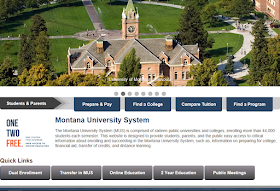The Montana University System encourages students to give college a try while they are still in high school. Tuition is half the price for the same classes and credits they'd be getting as college freshmen or sophomores, they even get their first two classes for free, and homeschoolers are welcome.
 |
| https://mus.edu/ |
 |
| Drawing by E (age 14) |
When we ran into a college recruiter at a farmer's market touting the dual enrollment program, T gave the table a wide berth, and I didn't think much of it, except to step over and accept a free pen.
G (our second oldest) had marriage on the brain by her junior year, though we managed to stall the actual event until after she had graduated high school, and given college at least a perfunctory try. Not that you can't attend college while married (I certainly did), and not that dual enrollment wouldn't be right for the marriage minded (actually it be even better, because it can cut up to two years off of the time spent after high school in college), it just simply wasn't her thing.
 |
| Drawing by E (age 14) |
A (age 17), however, has jumped in with both feet. She's in her 5th semester now (counting one part-time summer semester between her junior and senior years), and has just started the last block of classes she will need to earn an associates degree, which she ought to receive about one week after she graduates from high school.
She's aimed at a transfer degree, that will transfer into a bachelors program at the state university in one complete block. If she follows through with that, she will knock two years off of her time there.
And, should she decide to switch majors, or pick a university with slightly different requirements, she has still completed all of her core classes (college writing, math, speech, science, history and the like), and will have paid considerably less for her time of exploration and discovery than she would if she switched a major after two years of full on university tuition.
 |
| Drawing by E (age 14) |
"Statistically, students who take dual enrollment courses are more likely to successfully transition to higher education, and succeed academically at rates higher than students who do not take dual enrollment courses." (Reach Higher Montana).
It's great to be a (dual-enrolled) homeschooler.
I like the idea of exploring majors this way without using up undergrad years. I think I would have picked a completely different path if I could have explored first this way. There were so many options I just wasn't aware of!
ReplyDeleteThey do that here where we are, but my kid isn't interested enough to really push for the math needed for the ACT. We've done mostly interest led learning and now I'm feeling some regrets about that, since it means she is excellent in writing, on fire about Spanish, but "deficient" in math with gaps in science. The ACT feels like a huge insurmountable block! I'm new to your blog so I'm not sure yet what your school life looks like, but you struck a chord here!
ReplyDeleteSlim Pickins - I'm not sure how it works in your area, but don't give up! Our dual enrollment program only requires the a college placement exam (much easier than the ACT) that can be taken again and again - and if a student doesn't make the grade in certain subjects (such as math) they can take pre-courses to qualify (math at the simpler levels, that don't count for college credit, but when completed count as the prerequisite needed to get into the college level courses). If they are going to do that anyway, better to do it at the less expensive, dual-enrollment level. And in the meantime they can knock off college writing, history, speech, and the other courses that don't require any math skills.
ReplyDeleteOur local junior college allows homeschoolers to dual enroll and they can take a certain amount of classes free per semester, so I'm definitely looking into it for my kids in a year or two.
ReplyDeleteOur community colleges allow dual enrollment starting in 10th grade, and it's free for public school kids. A is already talking about potentially taking a couple of classes when she is a junior and a senior - her current headmaster said that they could support that on their side.
ReplyDelete